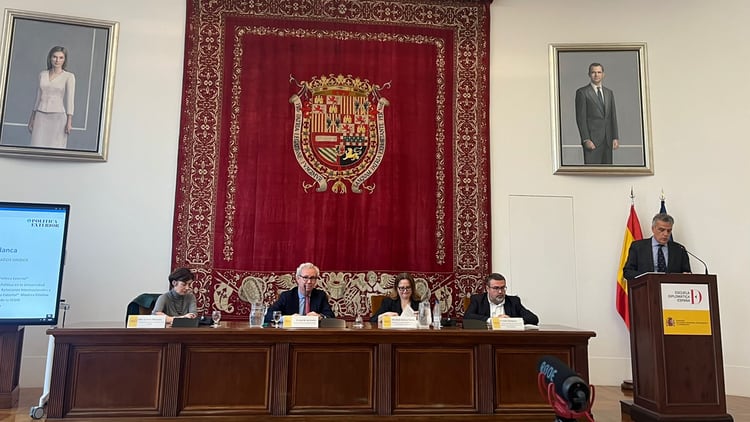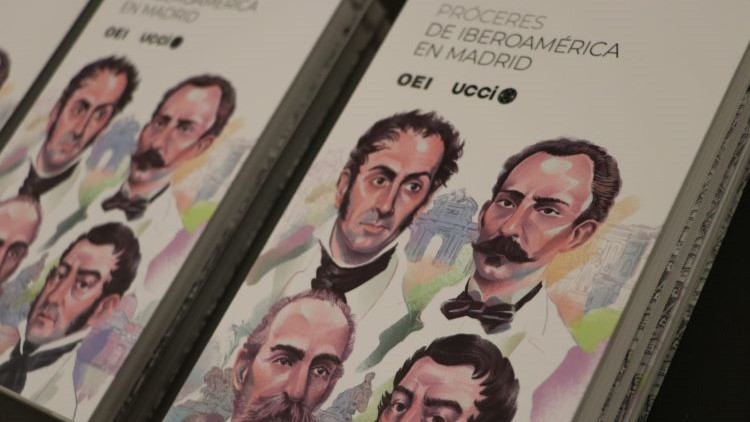Alba Córcoles
“The road to the White House is tortuous, winding and full of mines,” said the ambassador, director of the Diplomatic School, Santiago Miralles, in the presentation of a debate on the upcoming elections in the United States, held at the headquarters of the institution.
The debate, attended by a hundred people, was organized by the Foreign Policy Analysis Foundation, under the title “The Road to the White House,” and included the participation of José M. de Areilza, director of the magazine Política Exterior; Ruth Ferrero-Turrión, professor of Political Science at the Complutense University, and Pedro Rodríguez; professor of International Relations at the Universidad Pontificia Comillas and content director of the magazine Política Exterior, acting as moderator Cristina Manzano, director of External Relations of the Ibero-American General Secretariat (Segib).
The speakers analyzed the perspectives of North American politics in the face of the November presidential elections and the dispute that the candidates Donald Trump, for the Republican party, will maintain; and Joe Biden, for the Democratic Party.
Ruth Ferrero-Turrión stated that “the enormous sociopolitical polarization that has been reached in the United States faces an amalgamation of the Republican extreme right that is far from a very fragmented and poorly coordinated Democratic party.”
For his part, José María de Areilza highlighted that “bridges of consensus have not been built,” and described the United States as a “dysfunctional superpower,” after making “the economy work where politics does not work.”
In reference to a possible return of Donald Trump to the White House, Pedro Rodríguez warned that “although Trump voters are accused of being ignorant, there is an incipient effort to legitimize ‘Trumpism’ – more professional, institutionalized–.”
The speakers commented that Americans have accepted that their children will not have a better future and that the meritocracy on which the American dream was based is faltering.
In this sense, Professor Ferrero-Turrión indicated: “Globalization has collaterally made social mobility difficult and no longer favors the West as much. Faced with this, Trump nostalgically appeals to the world of yesterday where there was no room for open and fluid societies.”
Pedro Rodríguez pointed out that, from among the harmed, appealing especially to those who never usually vote, Trump’s electoral mass is born that seeks a disruptor of the unsatisfactory status quo.
Areilza, for his part, noted that “really, although the discourse is biased, the problems it leverages are real and very painful. “This is why the worst thing you can do with Trump is underestimate him.” He added that, in contrast, his electoral rival must “deal with his success without reward.”
According to the director of Política Exterior, Biden is guilty of “not knowing how to adequately convey the achievements of his legislature, which converges with the nationally widespread pessimism.” Added to this would be the gradual loss of voters due to his position in the Gaza conflict.
In any case, it was noted in the round table that the presidential challenge that is made up of ‘half plus one’ of the Electoral College and that right now remains quite tied, with only a slight 4% advantage for Trump.
In the debate, it was highlighted that another key factor for the United States is its position in foreign policy, which for the moment maintains an orientation towards the Asia-Pacific axis. “The United States is an empire in decline that struggles to maintain its hegemony in the shadow of increasingly powerful rivals like China,” said Ruth Ferrero-Turrión.
Regarding Europe, the professor emphasized that “the EU meanwhile loses decision-making capacity in the international order, a result of America that no longer wants to be Europe.” A situation that is especially noticeable after Trump announced that he would not defend any NATO member that did not meet the defense spending target of 2% of GDP agreed at the Wales Summit.
To close the debate, the speakers discussed how democracies are eroding and the risks to the rule of law that Donald Trump could bring back such as political (self-)impunity, the dictatorship of minorities or a cognitive crisis that drowns in fake news and conspiracy theories, the experts agreed.







